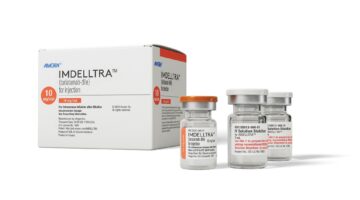
A motor vehicle accident left Dalton Shaull, co-founder and CEO of OmniLife Health, with a paralyzed arm, which led to a nerve transplant in 2014 that saw him going from “complete paralysis to full functionality.” Because of that experience, Shaull helped create OmniLife Health, a company that aims to streamline workflows for transplants.
OmniLife Health, based in Lexington, Kentucky, won the MedCity News INVEST Pitch Perfect contest on May 23, beating five other payer/provider startups.

BioLabs Pegasus Park Cultivates Life Science Ecosystem
Gabby Everett, the site director for BioLabs Pegasus Park, offered a tour of the space and shared some examples of why early-stage life science companies should choose North Texas.
The startup’s key product is called FlowHawk, which improves clinical workflows for complex care — specifically organ transplant and organ failure care (though the company hopes to expand to oncology in the future). The platform helps automate processes including communication (like HIPAA compliant messaging), documentation, billing, reporting and quality.
This kind of support is needed as providers are bogged down with administrative tasks. Physicians spend on average 1.77 hours a day completing documentation outside of office hours, according to a study published in JAMA Internal Medicine. There are a lot of “redundancies” in complex care, in which patients may have several chronic conditions and require attention from several different specialists, Shaull said.
“What ends up happening — especially with more and more of this care happening outside of the four walls of the hospital — you have these different clinics, they’re not always on the same EHR. … It’s very hard to track and manage care through these processes,” Shaull stated in a recent interview.
A study published on FlowHawk in Sage Journals found that the product resulted in a 35% increase in organs transplanted and a 50% reduction in time from the initial organ offer to transplant. The company was chosen as the winner of the Pitch Perfect contest because of its outcomes, one judge said.

With the Rise of AI, What IP Disputes in Healthcare Are Likely to Emerge?
Munck Wilson Mandala Partner Greg Howison shared his perspective on some of the legal ramifications around AI, IP, connected devices and the data they generate, in response to emailed questions.
“I was impressed with OmniLife’s outcomes within the transplant market which seemed to have a strong impact on both cost and care, and look forward to seeing what other areas they launch into,” noted Kelsey Maguire, managing director of Sandbox Industries.
OmniLife sells its products to hospitals in a software-as-a-service license model, and has different prices based on the service lines the customer is using. Some of its customers include Mayo Clinic, Cedars Sinai and UPMC, according to the company’s website.
The startup has received interest from investors as well. It has raised about $5 million from angel investors, as well $3.5 million in non-dilutive funds through grants from the National Institutes of Health.
Other companies in the hospital operations management space include Symplr, Phreesia and Health Catalyst. However, Shaull said he considers these companies more as potential collaborators rather than competitors.
While OmniLife’s main focus is transplants today, it plans to lean further into organ failure and other areas in the future.
“Our vision is to go upstream in organ failure, help better manage patients waiting for transplants, help better manage organ failure patients, maybe prevent them from needing a transplant altogether with better care,” Shaull said. “Then ultimately, looking at other complex care verticals within the hospitals that we serve, whether it be for oncology with late-stage cancers, whether it be for trauma, cardiovascular, other service lines where there are complex care patients who are overlooked — niches that could be further optimized that aren’t being optimized in the EHRs today.”
Photo: MedCity News












